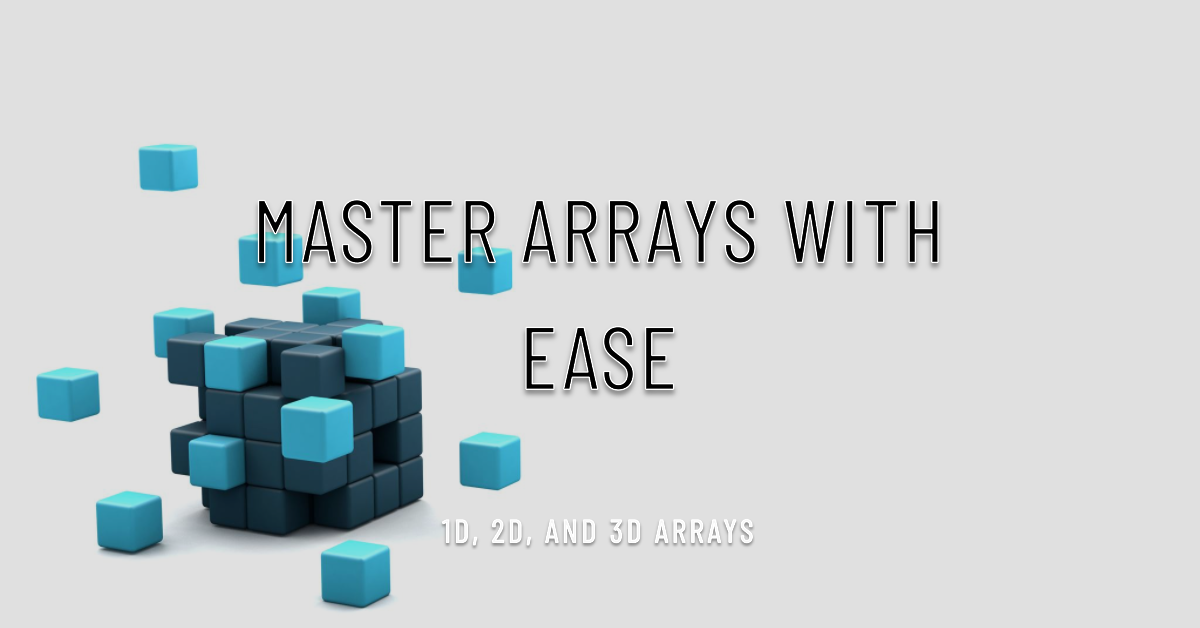Arrays
 Vishesh Raghuvanshi
Vishesh Raghuvanshi
1D Arrays:
Declaration and initialization of 1D arrays
1D arrays store a collection of similar type data elements using a single name.
Declaration:
type array_name[size];
Where type is the data type of the elements and size is the total number of elements.
Initialization:
int marks[5] = {34, 45, 78, 90, 98};
float prices[4] = {10.5, 20.2, 30.1, 40.0};
char names[6] = {'J','o','h','n',' ','D'};
Accessing array elements
Accessing Elements:
Elements are accessed using a subscript (index number) within square brackets [ ]. The index starts from 0.
array_name[subscript]
marks[0] // 34
marks[1] // 45
marks[4] // 98
Examples:
int roll_nos[20];
char names[5][20];
float temp[10] = {98.6, 99.2, 100.4, 101.0};
Arrays are stored in contiguous memory locations.
The variable name itself represents the base address of the array.
Arrays have a static size that needs to be specified during declaration.
The size of an array must be an integer constant.
Pointers to Arrays:
Declaring a pointer to an array
A pointer to an array is a variable that stores the base address of an array.
Declaring:
type *ptr_name = array_name;
Where type is the element type of the array.
Example:
int marks[5] = {10, 20, 30, 40, 50};
int *ptr = marks; // ptr points to the first element of marks array
Here ptr is a pointer to an array of integers that stores the base address of marks array.
Accessing array elements
We can access array elements using:
Subscript
[ ]
marks[i]Pointer arithmetic
*and+*(ptr + i)
Both are equivalent and yield the i-th element.
marks[0] == 10
*(ptr + 0) == 10
marks[1] == 20
*(ptr + 1) == 20
marks[2] == 30
*(ptr + 2) == 30
Example
#include <stdio.h>
int main() {
int marks[5] = {10, 20, 30, 40, 50};
int *ptr = marks; // ptr points to the first element of marks array
// Accessing elements using subscript
printf("Element at index 0: %d\n", marks[0]);
printf("Element at index 1: %d\n", marks[1]);
// Accessing elements using pointer arithmetic
printf("Element at index 0: %d\n", *ptr);
printf("Element at index 1: %d\n", *(ptr + 1));
// Traversing the array using pointers
for (int i = 0; i < 5; i++) {
printf("%d ", *(ptr + i));
}
return 0;
}
Output:
Element at index 0: 10
Element at index 1: 20 Element at index 0: 10
Element at index 1: 20
10 20 30 40 50
2D Arrays:
Declaration
A 2D array is declared as:
type array_name[row_size][col_size];
Where type is the data type of elements and row_size and col_size are the number of rows and columns respectively.
Initialization
2D arrays can be initialized in two ways:
Using Initializer List:
int marks[2][3] = { {34, 45, 78}, {90, 98, 67} };Using a For Loop:
int numbers[3][4]; for (int i = 0; i < 3; i++) { for (int j = 0; j <4; j++) { numbers[i][j] = i*j; } }
Accessing elements
Elements are accessed using two subscripts - one for the row and one for the column.
array_name[row][column]
Example:
marks[0][1] // 45
marks[1][2] // 67
Example
Adding Two Matrices:
#include <stdio.h>
int main()
{
int r, c, i, j;
printf("Enter rows and columns: ");
scanf("%d %d", &r, &c);
int a[r][c], b[r][c], sum[r][c];
printf("Enter elements of first matrix: \n");
for (i = 0; i < r; i++)
for (j = 0; j < c; j++)
scanf("%d", &a[i][j]);
printf("Enter elements of second matrix: \n");
for (i = 0; i < r; i++)
for (j = 0; j < c; j++)
scanf("%d", &b[i][j]);
for (i = 0; i < r; i++) {
for (j = 0; j < c; j++) {
sum[i][j] = a[i][j] + b[i][j];
}
}
printf("Sum of the matrices: \n");
for (i = 0; i < r; i++) {
for (j = 0; j < c; j++) {
printf("%d ", sum[i][j]);
}
printf("\n");
}
}
OUTPUT:
Enter rows and columns: 2 2
Enter elements of first matrix:
1 2
3 4
Enter elements of second matrix:
4 3
2 1
Sum of the matrices:
5 5
5 5
3D Arrays:
Declaration
A 3D array is declared as:
type array_name[x][y][z];
Where type is the data type of elements and x,y and z are the number of elements in the first, second and third dimensions respectively.
Initialization
3D arrays can be initialized using initializer lists:
int marks[2][3][4] = {
{
{1, 2, 3, 4},
{5, 6, 7, 8},
{9, 10, 11, 12}
},
{
{13, 14, 15, 16},
{17, 18, 19, 20},
{21, 22, 23, 24}
}
};
Accessing elements
Elements are accessed using three subscripts - one for each dimension.
array_name[x][y][z]
Example:
marks[0][1][2] // 11
marks[1][2][3] // 24
Example
#include <stdio.h>
int main() {
int marks[2][3][4] = { ... };
printf("Element at 0 1 2 is %d", marks[0][1][2]);
}
Passing Arrays to Functions:
Passing 1D Arrays:
A 1D array can be passed to a function like this:
void func(int array[]) {
// array used here
}
int main() {
int array[5] = {1, 2, 3, 4, 5};
func(array);
}
The array name acts as a pointer to its first element. So the function receives a pointer to the first element of the array, not a copy of the whole array.
Passing 2D Arrays:
A 2D array is passed as:
void func(int array[][]) {
// array used here
}
int main() {
int array[3][4] = { ... };
func(array);
}
Again, the array name acts as a pointer to the first element. The second dimension size can be omitted.
Passing 3D Arrays:
A 3D array is passed similarly:
void func(int array[][][]) {
// array used here
}
int main() {
int array[2][3][4] = { ... };
func(array);
}
Example:
void sum(int array[][3], int rows) {
int sum = 0;
for (int i = 0; i < rows; i++) {
for (int j = 0; j < 3; j++) {
sum += array[i][j];
}
}
printf("Sum is %d", sum);
}
int main() {
int array[2][3] = { ... };
sum(array, 2);
}
Function Pointers:
Declaring function pointers
A function pointer is declared as:
return_type (*function_pointer_name)(arguments);
For example:
int (*sum)(int, int); // pointer to a function that returns an int and has 2 int parameters
Defining and initializing function pointers
A function pointer can be initialized to point to an actual function:
int sum(int a, int b){
return a + b;
}
int main(){
int (*sum_ptr)(int, int) = ∑ // initialize pointer to point to sum()
}
Calling functions using pointers
The function is called using the pointer:
int result = sum_ptr(10, 20);
This calls the sum() function.
Example program
int sum(int a, int b) { ... }
int multiply(int a, int b) { ... }
int main() {
int (*func_ptr)(int, int);
func_ptr = sum;
func_ptr(10, 20); // Calls sum()
func_ptr = multiply;
func_ptr(10, 20); // Calls multiply()
}
Subscribe to my newsletter
Read articles from Vishesh Raghuvanshi directly inside your inbox. Subscribe to the newsletter, and don't miss out.
Written by
